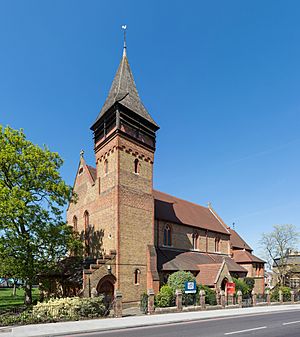St Mark's, Battersea Rise facts for kids
Quick facts for kids St Mark's, Battersea Rise |
|
|---|---|

St Mark's viewed from Battersea Rise
|
|
| 51°27′37″N 0°10′13″W / 51.4604°N 0.1702°W | |
| Location | Battersea Rise, London |
| Country | United Kingdom |
| Denomination | Church of England |
| Churchmanship | Conservative Evangelical |
| Website | http://www.stmarks-battersea.org.uk |
| Architecture | |
| Architect(s) | William White |
| Style | Victorian Gothic |
| Years built | 1874 |
| Administration | |
| Diocese | Diocese of Southwark |
St Mark's, Battersea Rise, is a beautiful old church in London. It was built a long time ago, during the Victorian era. This church is a special building, listed as Grade II*, which means it's very important historically. It's part of the Church of England. You can find it in the Clapham Junction area.
Contents
About St Mark's Church
This church was designed by a famous architect named William White. It was built between 1872 and 1874. The church has a special look called "Geometric Middle-pointed, 13th Century Gothic style." It's made with yellow bricks and has red brick patterns.
Inside the Church
Inside, the main part of the church, called the nave, has four sections. There's a tower on one corner with a wooden bell tower and a pointy roof. The pillars inside are made of concrete but look like stone, with cool carved tops made by Harry Hems. The floor inside is covered with tiles. Even the choir seats, the pulpit (where sermons are given), and the font (for baptisms) were designed by William White. The altar, which is a special table, is raised up.
A New Beginning for the Church
Over time, fewer people were attending St Mark's, and the building started to get old and worn out. But in 1987, something new happened! A group from another church, Holy Trinity Brompton, came to help. Pastor Paul Perkin, his wife Christine, and about 50 other people started a "church plant" at St Mark's. This means they helped the church grow and become active again.
Building Improvements
Thanks to donations from the people who joined the church, many improvements were made to the building. A new welcome hall was opened, and the meeting hall was made bigger in 2007. These changes helped the church have more space for its activities.
St Mark's and Its Community
St Mark's Church is known for being a conservative and evangelical church. In 2012, a newspaper called The Guardian wrote an article about it. The article talked about different discussions and viewpoints within the Church of England and the wider Anglican community. These discussions often involve how the church interprets its beliefs and traditions.
Boutflower Road's Name
Have you ever wondered how streets get their names? Boutflower Road, which runs next to St Mark's Church, is named after a person! It's named for Henry Boutflower Verdon. He was supposed to be the first vicar (a type of priest) for the church but sadly passed away young in 1879. This was seven years before the road was even built as part of a property development by Alfred Heaver.
 | Janet Taylor Pickett |
 | Synthia Saint James |
 | Howardena Pindell |
 | Faith Ringgold |

